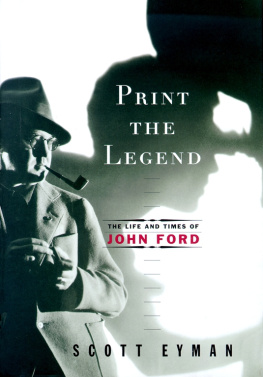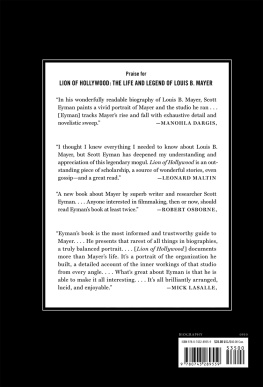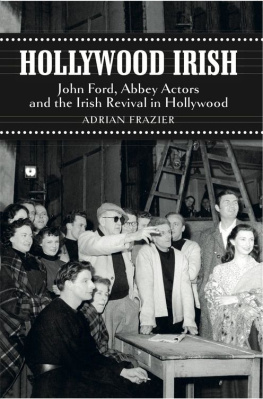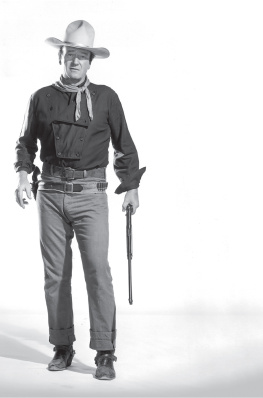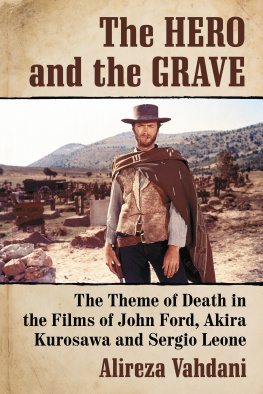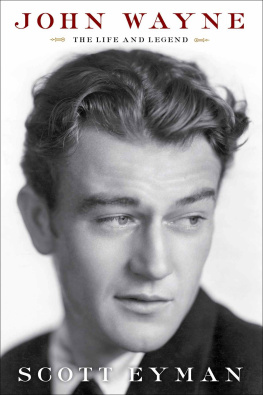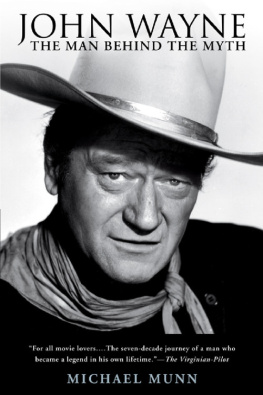
We hope you enjoyed reading this Simon & Schuster eBook .
Sign up for our newsletter and receive special offers, access to bonus content, and info on the latest new releases and other great eBooks from Simon & Schuster.

or visit us online to sign up at
eBookNews.SimonandSchuster.com
Thank you for purchasing this Simon & Schuster eBook .
Sign up for our newsletter and receive special offers, access to bonus content, and info on the latest new releases and other great eBooks from Simon & Schuster.

or visit us online to sign up at
eBookNews.SimonandSchuster.com
ALSO BY SCOTT EYMAN
The Speed of Sound: Hollywood and the Talkie Revolution (1997)
Ernst Lubitsch: Laughter in Paradise (1993)
Mary Pickford: Americas Sweetheart (1990)
Five American Cinematographers (1987)
Flashback: A Brief History of Film (with Louis Giannetti, 1986, 2nd edition 1991, 3rd edition 1996)



SIMON & SCHUSTER
Rockefeller Center
1230 Avenue of the Americas
New York, N.Y. 10020
www.SimonandSchuster.com
Copyright 1999 by Scott Eyman
All rights reserved, including the right of reproduction in whole or in part in any form.
Simon & Schuster and colophon are registered trademarks of Simon & Schuster, Inc.
Designed by Jeanette Olender
Library of Congress Cataloging-in-Publication Data
Eyman, Scott, date.
Print the legend : the life and times of John Ford / Scott Eyman.
p. cm.
John Ford filmography: p.
Includes bibliographical references and index.
1. Ford, John, 18941973. 2. Motion picture producers
and directorsUnited States Biography. I. Title.
PN1998.3.F65E96 1999
791.730233092dc21
[B] 99-37046 CIP
ISBN 0-684-81161-8
ISBN: 978-1-4516-8511-4 (eBook)
Excerpts from unpublished letters and documents of John Ford and Mary Ford
copyright 1999 by Dan Ford as Executor for the Estate of John Ford.
Reprinted by permission. All rights reserved.
Poem XXXVI from The Collected Poems of A. E. Housman by A. E. Housman,
Copyright 1936 by Barclays Bank Ltd., 1964 by Robert E. Symons,
1965 by Henry Holt and Company, LLC. Reprinted by permission
of Henry Holt and Company, LLC.
In memory of
Lindsay Anderson and Darcy OBrien
Lest We Forget
CONTENTS
The United States themselves are essentially the greatest poem the genius of the United States is not best or most in its executives or legislatures, not in its ambassadors or authors or colleges or churches or parlors, nor even in its newspapers or inventors but always most in the common people. Their manners speech dress friendshipsthe freshness and candor of their physiognomythe picturesque looseness of their carriage their deathless attachment to freedomtheir aversion to anything indecorous or soft or mean the fierceness of their roused resentmenttheir curiosity and welcome of noveltytheir self-esteem and wonderful sympathytheir susceptibility to a slightthe air they have of persons who never knew how it felt to stand in the presence of their superiorsthe fluency of their speechtheir delight in music, the sure symptom of manly tenderness and native elegance of soul their good temper and openhandedness these too are unrhymed poetry. It awaits the gigantic and generous treatment worthy of them.
FROM THE INTRODUCTION TO WALT WHITMANS
LEAVES OF GRASS
Half of an Irishmans lies are true.
ANONYMOUS
PRINT THE LEGEND
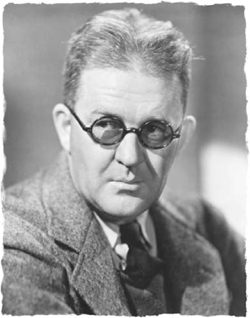
PROLOGUE
T he old man was in rare form, and he had picked a fine place for it.
The Lido is a tree-covered island about eight miles long and a few hundred yards wide that forms the eastern boundary of the Venice lagoon. In the first week of September 1971, John Ford came to the Lido, to the arabesque Excelsior Hotel, to be honored by the Venice Film Festival.
He was a frail, seventy-seven-year-old man in poor health who invariably contrived to give the entirely correct impression that he was not to be trifled with. On the boat from the airport, he had been plagued by a fussy attendant in the private vaporetto. Water a bit choppy, sir? the attendant had inquired. Fancy saying that to an admiral in the Navy, he shot back.
And now there was a critic at the door of his hotel room, come for his scheduled interview. Barbara Ford, her fathers traveling companion and handler, politely told the critic that the interview might not be possible; Daddy was being inconvenienced by some sudden stomach trouble. Come in, come in, yelled Ford from the lavatory. I can deal with two shits at once.
The critic soon disposed of, a couple of people from the British Film Institute arrived to talk to him about the upcoming season devoted to his films. He hadnt wanted to do any more talking, but Barbara said that shed go ask Daddy. She came back quickly. Daddy said he would give you three minutes.
Ford was in bed now, looking rough and ready. Ken Wlaschin, the director of the BFI, told him that they were looking for 35mm prints of some of his rarer films. It was a subject of no interest to Ford. Where do you come from? he asked Wlaschin.
Uh, Nebraska.
Yes, I can understand what you say. And where do you come from? Ford said, turning to John Gillett.
London.
I cant understand a goddamn thing you say.
Being put on the defensive was the customary surcharge for the pleasure of Fords company, and your reaction to the tough, unhelpful persona he had perfected would determine whether or not you were worthy to endure more of it. Gillett made a quick mental calculation that capitulation would be fatal.
In that case, he said, Ill move a little closer.
Whats happening tonight?
Gillett explained that a number of artists were going to be given awards and declared Maestros of Cinema.
Who?
Well, Marcel Carn
Never heard of him.
And Bergman.
Ingrid?
Ingmar.
Oh. He called me one of his favorites
An hour past their allotted three minutes, it was time for Wlaschin and Gillett to leave. John Ford had to get ready for the ceremony.
One of the two closing-night films of that years festival was Directed by John Ford , a documentary by Peter Bogdanovich that traced Fords career from his first directorial efforts in 1917. It was narrated by Orson Welles and contained excerpts from twenty-six of Fords more than 130 films, interviews with John Wayne, Henry Fonda, and James Stewart, and some hilariously cursory, unhelpful comments from Ford himself.
It was a rich tapestry that effectively communicated the bounty of Fords career, as well as his deceptive range. Here was The Iron Horse , the first Western epic, there the passionate sympathy for the dispossessed of The Grapes of Wrath; here the moody fatalism of sailors fighting a losing campaign in They Were Expendable , there the romantic idyll of The Quiet Man; here the unleashed misanthropic savagery of Ethan Edwards in The Searchers , there the gloomy resignation of The Man Who Shot Liberty Valance; here the glowing humanity of How Green Was My Valley , there the lean, laconic gravity of My Darling Clementine a tapestry of film cumulatively creating a vision of humanity that defined a nation and influenced the world.
Next page
